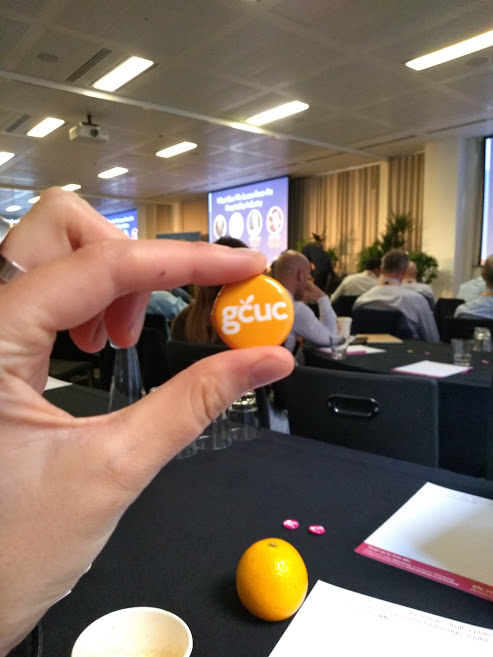- GCUC UK took place this week in London, where coworking operators, brokers, technologists, and designers shared valuable insights.
- In the future, the most successful operators will be those who are able to gather data and learn from it.
- There’s still ample room for growth in the industry, however operators would be wise to invest in technology.
This year’s GCUC UK got off to a juicy start with a scrumptious breakfast comprised of fruit, pastries and – of course – coffee in abundance.
After a quick catch up with old acquaintances and new, attendees made their way to the main conference space for a day of inspiring talks facilitated by Tim Devitt (Producer), Liz Elam (Founder) and Jonathan Weinbrenn (Compere).
Throughout the sessions we heard from a range of operators, brokers, technologists and designers who shared valuable insights into what success looks like in the coworking industry today. Check out the full programme and list of speakers on GCUC’s website.
For those who couldn’t make the conference, here are 10 key takeaways from day 1:

1. Machines are great but they can’t create
Real Estate Tech Strategist, Antony Slumbers, was the first speaker to take to the stage. He delivered a fascinating talk about how the flexible space industry needs to adapt in line with technological changes, and how the most successful operators will be those who A) are able to collect the best data, and B) are able to learn from said data.
A workspace’s digital layer must be interoperable.
From chatbots to voice search, we’re living in an age of rapid innovation. Today, inventions that would once have seemed pretty mind blowing quickly become the norm, which is why the pace of change seems so fast. Operators who don’t design their spaces with these new technologies, models and ways of working in mind risk falling behind, however…
There will always be a need for the human, because humans have the capacity for creative thought (including the ability to question) and empathy – and technology doesn’t.
In the words of Picasso: “Computers are useless, they can only give answers.”
2. We need to be more transparent with data metrics
The day’s second segment explored ideas around what the coworking industry can learn from the hospitality industry, particularly when it comes to benchmarking – the practice of comparing business processes and performance metrics to industry competitors’ in order to identify successes and areas for improvement.
Sarah Duignan, Director of Client Relationships at STR, believes benchmarking could really benefit the sector, however more operators need to be willing to share their data in order for it to work. Benchmarking can be used to inform a range of decisions, from paying bonuses to deciding where to open new coworking locations.
3. Investing in employees is crucial for success
There was a unanimous emphasis on the importance of investing in staff and most agreed that employee happiness should be one of the main metrics operators look at when determining how successful they are.
Your employees are your biggest advocates.
Structured career paths are also important, especially for larger operators. IWG, for instance, has implemented clear progression routes and encourages movement across their different centres and the countries they operate in.
4. There’s plenty of room for growth
When you’re immersed in the industry, it can feel like all other CRE types have died out or at least taken a back seat, when in actual fact flexible space still only accounts for 7% of the UK market (according to Instant’s latest stats). That means there’s lots of potential for new operators, existing brands looking to expand and traditional landlords who want to convert.
(The industry is also lagging behind when it comes to investment in technology.)
5. It’s all about the value proposition
The power of brand belief was another hotly discussed topic at this year’s conference. Brand values need to be clear and consistent across the board, but that doesn’t mean an operator’s buildings should all look the same and have exactly the facilities.
What works in one market might not in another.
A good coworking brand knows who they’re for and what they stand for.
Melissa Ablett, Strategic Director of Sales & Ops for Europe at Cambridge Innovation Centre explained that CIC’s brand is about people, and this is evident in how they measure success. Their key metrics include how much funding the startups within their space raise, how many jobs are created and how many choose to stay in the space as they grow.
6. Get the foundations right and the rest will follow
Tech this, tech that…
Instead of jumping on the latest trend (5G’s going to take ages to “get going” by the way), make sure you have the foundations right first. That means:
- Cabled connectivity in the right places
- Top notch WiFi
- Internet security (which is being cited as a major concern in the industry at the moment)
If you’re unsure of how to achieve this, speak to an expert.
7. Wellness means different things to different people
It’s easy to get a bit bogged down in the wellness topic to the point where it loses all meaning. Fora’s co-founder, Katrina Larkin, put it simply: wellness is different for everyone, which is why it’s so important for operators to treat each member as an individual.
For some, wellness is the simple feeling of fresh socks, for others it’s having the time and space in which to reflect. Fora are running a wellness week in October and will use it as an opportunity to find out what wellness means to their members.
8. Look to educational spaces for inspiration
This was an interesting point and one worth further investigation. The way we work is changing, so naturally the way we learn is also changing (check out the emergence of microlearning, for instance).
Spaces are no longer static – they’re agile, adjustable, malleable. In the talk titled “Is Today’s Office Fit For Purpose”, Chris Male from technologywithin pointed out that places like universities and science parks are interesting to look at when planning workspace design and tech.
9. Brokers will provide insights, providing they have data…
A proportion of the afternoon focused on the changing role of the broker. Moving forward, brokers have the opportunity to adopt a more consultatory role by leveraging their data to provide valuable insights to operators. “Data” is something brokers are focusing on more and more (note: half of Hubble HQ’s team are software engineers).
“The Role of the Broker in the Future” panel agreed that operators can work more closely with brokers to find out about in-demand and emerging markets, particularly in relation to pricing and occupancy rates. Again, transparency and a sharing culture is key.
10. Hurrah! Most people know what we do now
As Lucy Watts, Senior Director of Strategic Projects at Instant Group pointed out: most people know what a flexible workspace is now, so a broker’s main job is to help them navigate the sheer amount of choice out there today.
And finally, in the words of Antony Slumbers: “Flexible workspace is no longer a niche – it’s the norm!”



 Dr. Gleb Tsipursky – The Office Whisperer
Dr. Gleb Tsipursky – The Office Whisperer Nirit Cohen – WorkFutures
Nirit Cohen – WorkFutures Angela Howard – Culture Expert
Angela Howard – Culture Expert Drew Jones – Design & Innovation
Drew Jones – Design & Innovation Jonathan Price – CRE & Flex Expert
Jonathan Price – CRE & Flex Expert











